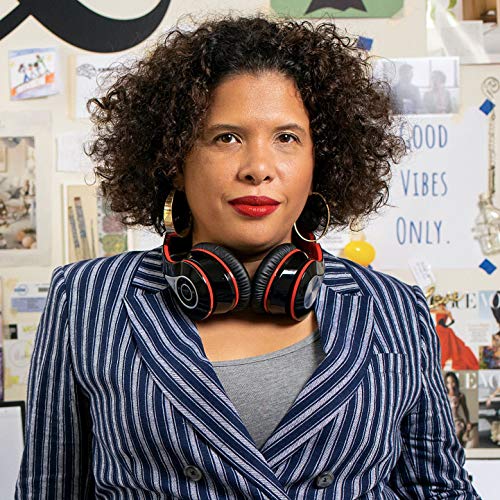In spite of Juleyka Lantigua-Williams’ best efforts, she could never outrun her passion and talent for storytelling.
Juleyka thought that her writing — the self-described “really bad poetry” she published in her high school literary magazine, and the “fiery opinion pieces” she wrote for her college newspaper — was just a hobby.
But when she realized that law school — an aspiration since childhood — actually wasn’t for her, it became clear that those experiences with the written word were much more than a recreational pastime.
“The thing that always came back was writing,” Juleyka says on an episode of Between Two Mics. “The thing that always came back was telling stories — and telling other people’s stories, because I find myself to be a genuinely uninteresting subject.”
After some traveling and soul searching, Juleyka threw herself into journalism and spent 18 years working for print publications like The Atlantic. And even though she confesses she was a latecomer to podcasting, nearly two decades into her career, Juleyka discovered a new love in audio storytelling.
Since then, she’s learned the ins and outs of the audio world and has launched Lantigua Williams and Co., which produces original content for black and brown audiences and supports clients who are on a mission to have their marginalized voices heard.
As a journalist, storyteller and entrepreneur in the audio space, Juleyka has learned a great deal about how to make an impact in podcasting.
Her unique combination of experiences make her a powerful voice in the industry. Read on for more of her thoughts on telling great stories, building projects around a meaningful mission and connecting with the right audience.
1. Infuse your work with intent by understanding your vision
Juleyka believes there are many similarities between starting a podcast and starting a business, most of which she discovered as a first-time entrepreneur in 2017.
Lantigua Williams and Co. began to gain momentum when Juleyka gained a clearer picture of her greater vision and how the work she’d done early on was setting her up to achieve it.
“The way you set down your building blocks is the way you make decisions and the intention that you put behind those decisions,” Juleyka says of starting a podcast or business.
“After about a year and a half, I was able to really hone in on my intention for the decisions that I was making — and that’s when things really started to happen. I was able to infuse the work that we were doing with that clarity of intent.”
It may take some time to see how all of the foundational decisions you make at the beginning of your project work together, but once you can see the connections more clearly, don’t wait to follow Juleyka’s lead and communicate that clarity with your team members, listeners and other stakeholders.
2. Don’t confuse yourself with your listeners
Juleyka believes there are two core elements to a successful podcast: a good idea and a clear sense of the right audience for that idea.
In her experience, it’s in discovering the latter where aspiring podcasters often struggle — especially if they assume that they are their intended audience.
“I break a lot of hearts when I tell people who are coming into our space, ‘You are not your ideal listener,’” Juleyka says. “You are doing the show and the idea a great disservice by acting as if you are the ideal listener. You’re not. You are the listeners’ advocate.”
In order to be an effective advocate for your listeners, your job is to step back, consider the listeners who are truly the best fit for your great idea and create a great experience for them.
As your show evolves, you must also learn as much as you can about your listeners so you understand your target audience inside and out.
3. Experiment constantly
One of Juleyka’s favorite things about the podcasting world is that it’s “ruthless.”
It’s impossible to hide if your show isn’t delivering on quality, which can be intimidating — but it also fosters a spirit of experimentation that she feels is necessary in American media. As a medium, podcasting is accessible and agile, so if a show isn’t working initially, creators can go back to the drawing board fairly easily and try something new.
“You can experiment really quickly,” she says. “If you are someone who doesn’t dwell, then you can just iterate and learn from your mistakes and keep moving.”
So don’t dwell! If your podcast isn’t working the way you hoped it would, it’s never too late to make changes and, if necessary, start from scratch.
4. Know your wins — and celebrate them!
“I’m a firm believer that everyone can win in podcasting,” Juleyka says. “You just have to know what a win looks like for you.”
A win might look like achieving certain metrics, having the opportunity to tell unique stories or making connections with people you haven’t previously had access to.
Think about how you can define winning within the context of your particular show and vision, then be prepared to celebrate those wins as they come.
For more of Juleyka’s insights on telling stories, entrepreneurship and finding the right audience for your show, listen to this episode of Between Two Mics. Be sure to subscribe to get future episodes directly in your preferred podcast player.
Rockwell Felder is a CPA, entrepreneur, and co-founder of SquadCast. He and his team are on a mission to amplify collaboration, seeking to empower creatives to engage in meaningful conversations without barriers.
